October 19, 2006
Phonograph blues
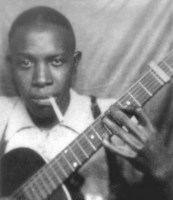 | 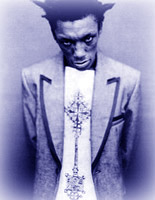 | There are only five dates in Johnson's life that can undeniably be used to assign him to a place in history: Monday, November 23; Thursday, November 26; and Friday, November 27, 1936, he was in San Antonio, Texas, at a recording session. Seven months later, on Saturday, June 19 and Sunday, June 20, 1937, he was in Dallas at another session. Everything else about his life is an attempt at reconstruction. As director Martin Scorsese says in his foreword to Alan Greenberg's play 'Love In Vain: A Vision of Robert Johnson', "The thing about Robert Johnson was that he only existed on his records. He was pure legend."- Wikipedia on Robert Johnson | The way that Tricky works – fucking around with sounds on the sampler until his sources are unrecognisable wraiths, ghosts of their former selves; composing music and words spontaneously in the studio; mixing tracks live as they're recorded; retaining the glitches and inspired errors, the hiss and crackle – all this is strikingly akin to early Seventies dubmeisters like King Tubby. - Simon R on Tricky, June 1995 |
Owen's brief comment on blues records a while back says something crucially important about sonic hauntology:
- there's surely no music more utterly dominated by its recording technology than 1930s blues. Listening to Robert Johnson you have, rather than the expected in yr face earthiness and presence, layers upon layers of fizz, crackle, hiss, white noise, as if its been remixed by Basic Channel rather than recorded in a room in some mythologised deep south.
All that needs to be added to this is the idea that the 'mythologized deep south' arises from the 'layers of fizz, crackle, hiss, white noise'; there is no presence except mythologically, no myth without a recording surface which both refers to a (lost) presence and blocks us from attaining it. Rockism could be defined as the quest to eliminate surface noise, to 'return' to a presence which, needless to say, was never there in the first place; hauntology is a coming to terms with the permanence of our (dis)possession, the inevitability of dyschronia.
I repeat, I re-cite: hauntology is the closest thing we have to a movement, a zeitgeist, at the moment (and one of the uncanniest aspects of it is the fact that there seem to be very few lines of explicit influence among the artists involved).
In his crucial piece in the new Wire, Simon backs away from the term 'hauntology' because of its 'post-structuralist baggage'; but that 'baggage' is what gives the term its special purchase; and the fact that the hauntological discontinuum connects with the dyschronic condition which Derrida describes is what makes it more than the 'latest thing'.
Given that Simon devotes so much of his Wire piece to discussing the end of pop history, it is worth recalling that Derrida wrote Spectres of Marx in part about the 'end of history' thesis then being propounded by Fukuyama. In addition to being Derrida's book on Marx and Marxism, Spectres of Marx can also be read as his engagement with postmodernism. Postmodernism only achieves full-spectrum dominance after 1989, when 'apparently victorious' capitalism thinks it is in a position to declare the end of history. (It's worth noting here that Pop's confident forward motion doesn't long survive the end of the Cold War.) Derrida's title, needless to say, was a play on all of the ghostly imagery in Marx - most notably, of course, the opening line of the Communist Manifesto. 'A spectre is haunting Europe - the spectre of Communism.' Part of the point was: if communism has always been spectral, what does it mean to say that it is now dead?
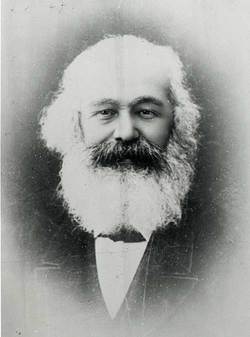 | 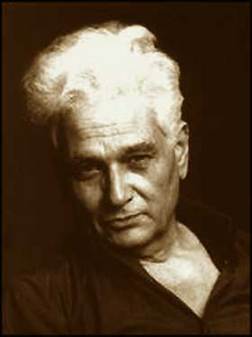 |
Derrida's other major reference plex is Hamlet, especially the line, 'The time is out of joint.' It is this sense of temporal disjuncture that is crucial to hauntology. Hauntology isn't about the return of the past, but about the fact that the origin was already spectral. We live in a time when the past is present, and the present is saturated with the past. Hauntology emerges as a crucial - cultural and political - alternative both to linear history and to postmodernism's permanent revival.
Ten years ago, we would have looked to SF and cyberpunk for this alternative. But hauntology and cyberpunk can now emerge as twins; travelling back in time in Butler's Kindred is the complement of the violent irruption of the past in Morrison's Beloved. It's no accident that hauntology begins in the Black Atlantic, with dub and hip-hop. Time being out of joint is the defining feature of the black Atlantean experience. As Mark Sinker wrote, the 'central fact in Black Science Fiction - self-consciously so named or not - is an acknowledgement that Apocalypse already happened: that (in PE's phrase) Armageddon been in effect.' In this disjunctive time, it makes perfect sense for Terminator X to juxtapose samples of helicopters with discussions about the slave trade, as he does on Apocalypse...91. There is no way in which a trauma on the scale of slavery - 'the holocaust that's still going on' as Chuck D had it - can be incorporated into history, American or otherwise. * It must remain a series of gaps, lost names, screen memories, a hauntology. X marks the spot... The deep, unbearable ache in Kindred arises from the horrible realisation that, for contemporary black America, to wish for the erasure of slavery is to call for the erasure of itself. What to do if the precondition for your being is the abduction, murder and rape of your ancestors?
The trauma that postmodernism screens is the catastrophe of Capital: the terminator of history, there from the beginning distributing microchips to accelerate its advent. Postmodernism is characterised by what Jameson calls the 'nostalgia mode'. Now, it is important to remember that the nostalgia mode is not explictily nostalgic. On the level of content, the productions of the nostalgia mode make no reference to the past at all; yet formally, they are reiterations. Jameson's example is Body Heat, a film given a modern-day setting but which was clearly made according to the formal conventions of 40s noir. Here, there is dyschronia but is disavowed. The exact equivalent of this in pop are Franz Ferdinand and the Arctic Monkeys (I note that hype about the latter seems to be dissipating at an unseemly rate - with any luck they will be this year's Darkness). There is an interesting way in which cultural products that are openly nostalgic cannot belong to the nostalgia mode - precisely because they pointedly raise issues of temporality and historicity which the nostalgia mode must suspend.
Compare Burial to the 'New Rave' for an illustration of the difference between a hankering for the past and the nostalgia mode. Burial implicitly accept that the whole concept of 'New' Rave is a contradiction in terms, that rave posited an endlessly dilated Now eternal, that to 'repeat' rave would not to be to re-iterate it. Far better, to mourn for rave, to point to its absence, than to pretend that it could be re-lived - since re-living was what Rave precisely was not doing. That was what Rave was: an alternative to (Indie) re-living. (Incidentally, it's hard to believe that the Guardian's piece on New Rave - which talks of 'the dark days of 1991-93' when 'it looked like the guitar really was extinct' - isn't a piece of deliberate comedy; it is certainly rockist self-parody, establishing that the Guardian apparently has an infinite pool of buffoons to draw upon when it comes to pop coverage. Who would listen to the Prodigy's 'Charly' and Altern 8 these days, eh? It's only fifteen years ago when such records could be hits but the gap between then and now seems absolute.)
Dyschronia is not repressed in hauntology; it rises to the surface. Or rather, it unsettles the very distinction between surface and depth, between background and foreground. In sonic hauntology, we hear that time is out of joint. The joins are audible - in the crackles, the hiss...
It's no accident that Tricky should keep coming back at the moment, that Ian's groundreaking piece on Tricky in the Wire should have been the first to broker seriously the concept of 'sonic hauntology', that, when I first heard Burial, I would reach for Tricky as a point of comparison, or that as I listen to Stone Cold Ohio I am continually reminded of Maxinquaye. Listen back to 'Aftermath' - with its Blade Runner sample ('Let me tell you about my mother'), and its citations from Japan's 'Ghosts'; it's almost too perfect. Listen, again, to what Ian had to say:
- Is it merely coincidence that the Sylvian quote and the Blade Runner lift converge in the same song? "Ghosts"...Replicants? Electricity has made us all angels. Technology (from psycho-analysis to surveillance) has made us all ghosts. The replicant ("YOUR EYES RESEMBLE MINE...") is a speaking void. The scary thing about ‘Aftermath’ is that it suggests that nowadays WE ALL ARE. Speaking voids, made up only of scraps and citations ... contaminated by other people's memories ... adrift ...
What Little Axe, Burial, Ghost Box, The Caretaker share with Tricky is that they foreground the surface noise. There is no attempt to smooth away the textural discrepancy between the crackly sample and the rest of the recording. This is one reason why hauntology is not just some lazy, hazy term for the ethereal. Hauntology isn't about hoky atmospherics or 'spookiness' but a technological uncanny.
The spectres are textural. The surface noise of the sample unsettles the illusion of presence in at least two ways: first, temporally, by alerting us to the fact that what we are listening to is a phonographic revenant, and second, ontologically, by introducing the technical frame, the unheard material pre-condition of the recording, on the level of content. We're now so accustomed to this violation of ontological hierarchy that it goes unnoticed. But in his Wire piece, Simon refers to the shock he experienced when he first heard records constructed entirely out of samples. I vividly recall the first time I went into studio and heard vocal samples played through a mixing desk; I really do remember saying, 'It's like hearing ghosts...'
(As to the necromantic aspect of sampling: remember that when Keith Leblanc sampled Malcolm X's voice on 'No Sell Out', it was practically regarded as an act of sacrilege at first.)
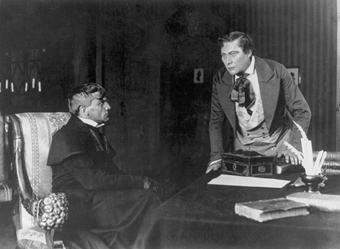 |  |
Whether or not Robert Johnson really did strike a Faustian bargain, the Gothic dimension of the recording process could not have escaped the imagination of the man who wrote 'Phonograph Blues' and 'Hellhound on my Trail'. What cinema had commented upon and instantiated in films like The Student of Prague - the uncanny presence of the double - Johnson confronted in the encounter with his recorded voice: the part (object) of him which would achieve immortality, returning, buried beneath crackle and hiss, as a phono-doppelganger.
Modernity was built upon 'technologies that made us all ghosts', and postmodernity could be defined as the succumbing of historical time to the spectral time of recording devices. Postmodernity screens out the spectrality, naturalising the uncanniness of the recording apparatuses. Anyone hearing a recording of their own voice or seeing a photograph of themselves is presented with a double. The uncanny thought, often repressed or forgotten, is that the recordings and the photographs will survive us; that as we contemplate them, we are put in the position of a ghost. (It's no surprise that Poe wrote one of the earliest essays on photography. Who knows what he would have made of phonography? One of the interesting things about Skeleton Key, a film of little merit but which has kept coming back to me since I saw it last year, is that the horror is intimately connected with records and recordings.)
It's no accident that Johnson was recording at around the same time as Al Bowlly - that is, at a time when recording technology had developed sufficiently to achieve a kind of sepia effect but not well enough that the audio simulation had become convincing, life-like.
Too high a resolution and we enter the time of the ubiquitous icon, that which is all-too-familiar. The ellipses in Johnson's life - 'there are only five dates in Johnson's life that can undeniably be used to assign him to a place in history' - are another kind of 'hiss' that adds to his mystique, of course. It is as if history never happens; either there are too many gaps, which have to be filled with rumours, supposition and fantasy; or there is an excessive, exhaustive record, so complete as to render the narration of history redundant.
In an excellent summary of hauntology on Dissensus, possibly the clearest and most succinct yet, John Doe refers to 'disinternment - a disinternment of styles, sounds, even techniques and modes of production now abandoned, forgotten or erased by history'. Yet, in sonic hauntology, disinterment goes alongside internment, the deliberate burial of signal behind noise.
What is mourned for most keeningly in the Ghost Box and Mordant Music records, it often seems, is the very possibility of loss. VHS, DVD and multi-channel TV mean that the fugitive evanescence that once used to characterize the watching of television programmes - seen once, and then only remembered - is now gone (think of how the very word 'broadcast' now seems quaint). 70s television was in modernist time; and with Ghost Box, it's difficult to know whether you are dealing with nostalgic modernism or modernist nostalgia, or whether the distinction makes any sense.
The story of Basinski's Disintegration Loops - tapes that destroyed themselves in the transfer to digital - is a parable (again almost too perfect) for the switch from the fragility of analogue to the infinite replicability of digital.
Mordant Music's Dead Air sounds like an electro/rave version of The Disintegration Loops. Mordant are fascinating in part because, as Simon points out in his Wire piece, they affirm decay and deliquescence as productive processes. It is as if the mould growing on the archives is the creative force behind their sound. Listening to Dead Air is like stumbling into an abandoned museum 200 years into the future where old rave tracks play on an endless loop, degrading, becoming more contaminated with each repetition; or like being stranded in deep space, picking up decaying radio signals from a far distant earth to which you will never return; or like memory itself re-imagined as an oneiric television studio, where fondly recalled television announcers, drifting in and out of audibility, narrate your nightmares in reassuring tones.
 |  |
There are obvious parallels between Mordant's 'uniquely British tone of despair and decay' and the Burial LP, even if Burial's ghosts are junglist, while Mordant's a more motley bunch. What is compelling in both cases is that the sounds that are being elegiacally de-vived belong to dance music. Dancehalls submerged in hiss.... collective dreams buried....
* Mention of American history brings us back, inevitably, to Greil Marcus. (Before I go on, and for the record, I make, surely unnecessarily, all of the disclaimers about acknowledging Marcus' brilliance etc.) But Ian's original point was more subtle than it is being given credit for. It's not that Marcus' preferences are 'sonically incorrect'; dub is exactly the sort of thing he will claim to like, but which he avoids writing about in any depth. The suspicion must be that the evasion of dub (and rap) is more than a matter of contingency, it is constitutive. I think this is evident by posing a simple question: where is production in Marcus's writing? References to producers - or production techniques - in Marcus are, at best, fleeting. There is a very definite metaphysics of presence at work in his writing. For all the alleged disjunctures of Lipstick Traces, it ultimately centres not only on the Pistols, but a Pistols' live performance. The unlive, dubbled aspect of pop is what Marcus represses, consistently: why Gang of Four and not the Pop Group, why do Joy Division merit only a passing mention but the Clash and Costello get page after page, why are the Slits celebrated until they are ... produced (by Dennis Bovell)?
It is this perpetually deferred encounter with the technological uncanny which means that, no amount of using the words 'weird' or talking about old records, will necessarily give Marcus a take on hauntology. I haven't read any of Marcus' Old Weird America material, so correct me if I'm wrong - isn't it about Dylan? - but couldn't all this return to field recordings be fitted, all-too-comfortably, into a quest for presence? I haven't read any of the new one, either, but The Voice of American Prophecy has metaphysics of presence written all over it. The whole reterritorialization on American history could also be read as a repression of the Black Atlantic, but that's another story.
Posted by mark at October 19, 2006 07:17 PM | TrackBack